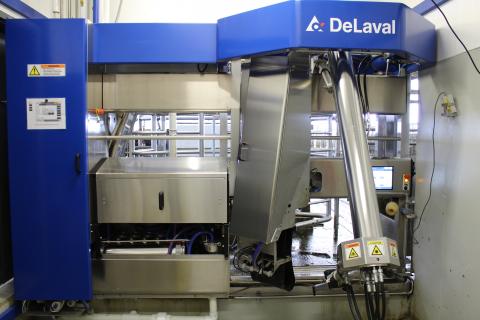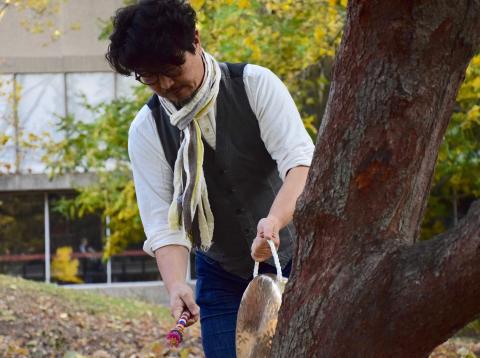- About the Office of Research
- Welcome Message
- Meet the Vice-President (Research)
- Strategic Research Plan
- Mission Statement
- Services and Divisions
- Discover our Research
- Research Chairs
- Facts and Figures
- Centres, Institutes, and Groups
- International Research
- Find a Researcher
- Core Research Facilities
- For Researchers
- Safeguarding Research
- Commercialization Policy and Framework
- Indigenization, Equity, Diversity and Inclusion in Research
- Research Alerts
- Funding
- Ethics and Regulatory Compliance
- Research Integrity and Conflict of Interest
- Patenting, Licensing, and Commercialization
- Honours and Awards
- Ontario Agri-Food Innovation Alliance
- Other Considerations and Resources
- Forms, Policies, Guidelines, and Procedures
- Interactive Support Sessions for Researchers
- Researcher Training and Development
- Research Administration Information Management System (RAIMS)
Data Science: Promoting Early Disease Detection in Robotic Milking Systems

Robotic milking systems can lead to early disease detection in dairy herds.
By Sydney Pearce and Cate Willis
Analyzing thousands of robotic milking system records has taught University of Guelph dairy researchers a vital lesson—cow behavioural changes documented by such systems can help predict certain disease events earlier.
On-farm, these systems can let farmers know that cows are unwell up to four days or more before milk yields drop, allowing farmers to intervene sooner, says Dr. Trevor DeVries, a professor in the Ontario Agricultural College.
Data Science: Taming the Complicated World of Wheat Genetics

Healthy wheat (above) as seen under a microscope; unhealthy wheat (right).
By Samantha McReavy
Using high-performance computing (HPC) power provided by the SOSCIP consortium cloud services, researchers at the University of Guelph are identifying novel genes linked to disease resistance in wheat to develop a robust crop variety. Disease-resistant varieties make better use of farmers’ resources.
Post-doctoral researchers Soren Seifi and Mina Kaviani and senior scientist Mitra Serajazari in the...
Data Science: Protecting Water on Agricultural Land

GIS mapping is helping to create effective management strategies to protect the environment.
By Alicia Bowland
Bayfield, Ontario, a waterfront community on gorgeous Lake Huron, is cottage country to some. But to others, it’s the home of the Gully Creek and Bayfield North watersheds, comprising 40 square kilometres of natural, recreational and agricultural land whose waterways drain into the lake.
And data is helping keep it pristine.
Watersheds—areas of land that drain water and snowmelt to rivers and lakes —are vital for...
Data Science: Sustainable and Profitable

By Samantha McReavy
Improving the sustainability of farms while maintaining profitability is essential to protect the livelihood of farmers and the health of the planet. Farmers need to be profitable to stay in business. But they also need to look after their farms to keep producing food for the long run.
That’s where profitability mapping comes in. These maps show farmers an estimate of how much money they are making—or losing—on specific areas of their farm.
...
Data Science: The World of Artificial Intelligence

Kindred, co-founded by Prof. Graham Taylor, is a robot that can manage warehouse organization.
By Samantha McReavy and Mya Kidson
Artificial intelligence (AI) technology is all around us—although we may not always be aware of it—from self-driving cars to online product recommendations, practical speech recognition, text prediction and even the development of a globally accessible COVID-19 antiviral pill. AI is constantly being used to improve lives.
Dr. Graham Taylor, an engineering professor at the University of Guelph and interim Research Director at the Vector Institute,...
Data Science: Strengthening Automotive Safety with In-Lab Technologies

DRiVE lab is led by Prof. Lana Trick (left), pictured here with students Heather Walker and Rylan Waring.
By Samantha McReavy
A high-tech driving simulator at the University of Guelph is using data to improve driver safety by identifying factors and behaviours that increase the risk of collisions.
The University of Guelph DRiVE lab (Driving Research in Virtual Environments) is led by Drs. Lana Trick, Department of Psychology; Andrew Hamilton-Wright, School of Computer Science; and Michele Oliver, School of Engineering. The lab houses a...
Data Science: The Multidisciplinary Impact of Improvisation

Korean percussionist Dong-Won Kim at a ground-turning ceremony for U of G’s MacKinnon Building renovation and its new ImprovLab.
By Sydney Pearce and Cate Willis
Dr. Ajay Heble, School of English and Theatre Studies, founded the International Institute for Critical Studies in Improvisation (IICSI). This partnered research institute looks into how artistic improvisation can be a model for social change, and how improvisatory practices can benefit community health and technological communication through engagement and collaboration.
“It’s exciting to see how members of the IICSI research team are engaged in the creation and development of digital tools and...
Data Science: Compusense

Compusense today: measuring and constantly striving to improve.
By Alicia Bowland
Compusense makes software for conducting sensory research and consumer studies. The Guelph-based company was founded in 1986 by Chris Findlay, an adjunct professor in the University of Guelph’s Department of Food Science.
Various consumer products and their surroundings convey sensory properties that consumers respond to differently. Sensory research measures consumer response to a stimulus.
“Step...
U of G’s Mass Spectrometry Facility Offers Unique Learning Experiences

Senior Research Technician Dr. Armen Charchoglyan with MSc student Elisa Lau.
By Cate Willis
Chemistry, food science, biomedical and toxicology researchers will benefit from new tools installed in 2021 in the University of Guelph’s mass spectrometry facility.
The new equipment – including a Thermo nLC Exploris 240 for quantitative protomics, a Waters LC Synapt Q-Tof with ion mobolity and a Bruker LC EVOQ Qube triple quadrupole MS for small molecule quantitation – will expand U of G’s research capacity and provide novel learning experiences for the next generation of researchers, says Dr. Dyanne Brewer, facility manager.
...
Data Science: A Shifting Research Paradigm

Malcolm Campbell, Vice-President (Research)
COVID-19 turned research on its head.
Since early 2020, we’ve had to rethink how, why, when and where research takes place. Confronting the COVID-19 virus provided University of Guelph with one of its greatest challenges and it has responded in kind. Our researchers have repurposed innovations, conducted cutting-edge research, offered their expertise to pandemic efforts and applied data to help people everywhere understand, manage and react to the unprecedented situations we face.
The COVID-19 pandemic isn’t the only...
Artificial Intelligence Research
At the University of Guelph, artificial intelligence drives discovery across disciplines. Researchers are advancing AI technologies to solve complex problems and create positive societal impact, both locally and globally.